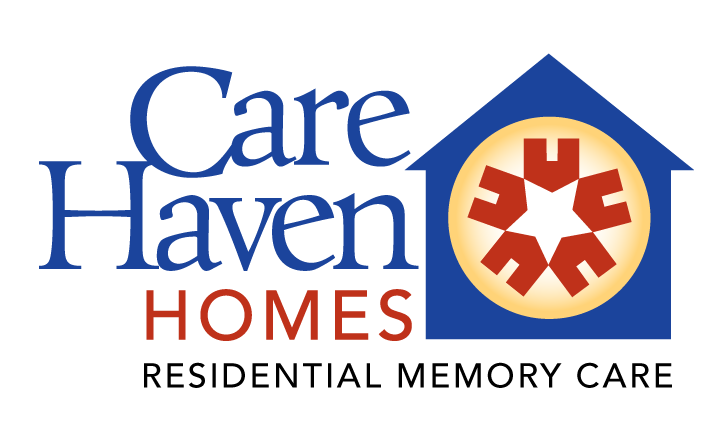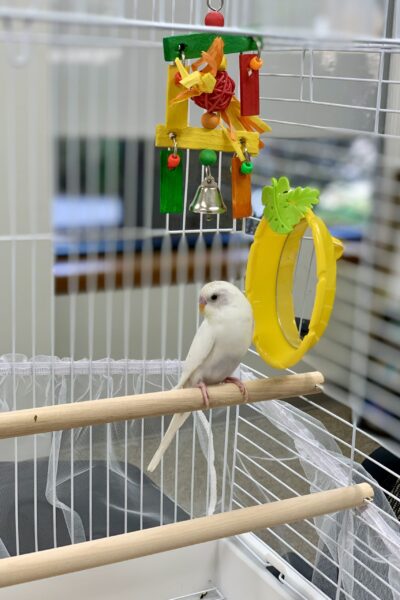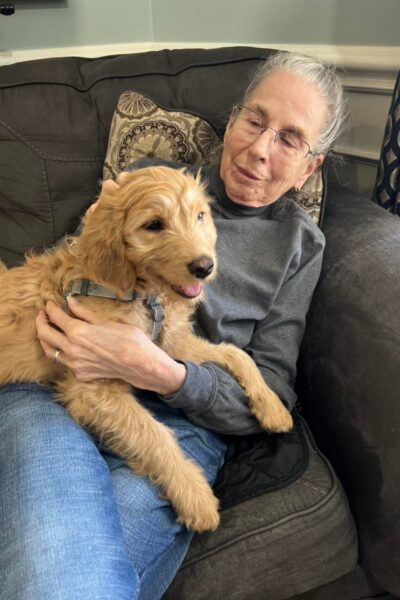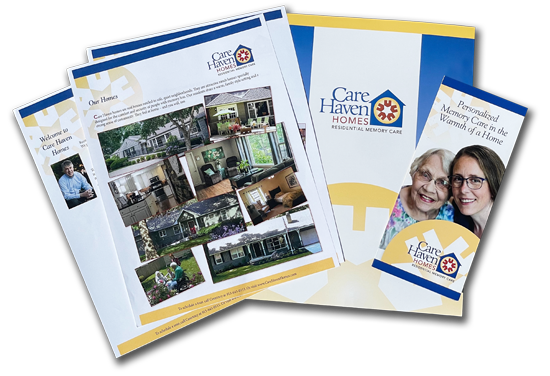A memory care activities program shouldn’t be a hodge-podge of random diversions. Instead, it should be the centerpiece of residents’ daily lives. That’s why ours is overseen by an expert in the field, working full-time to accommodate each resident’s interests, preferences and abilities.
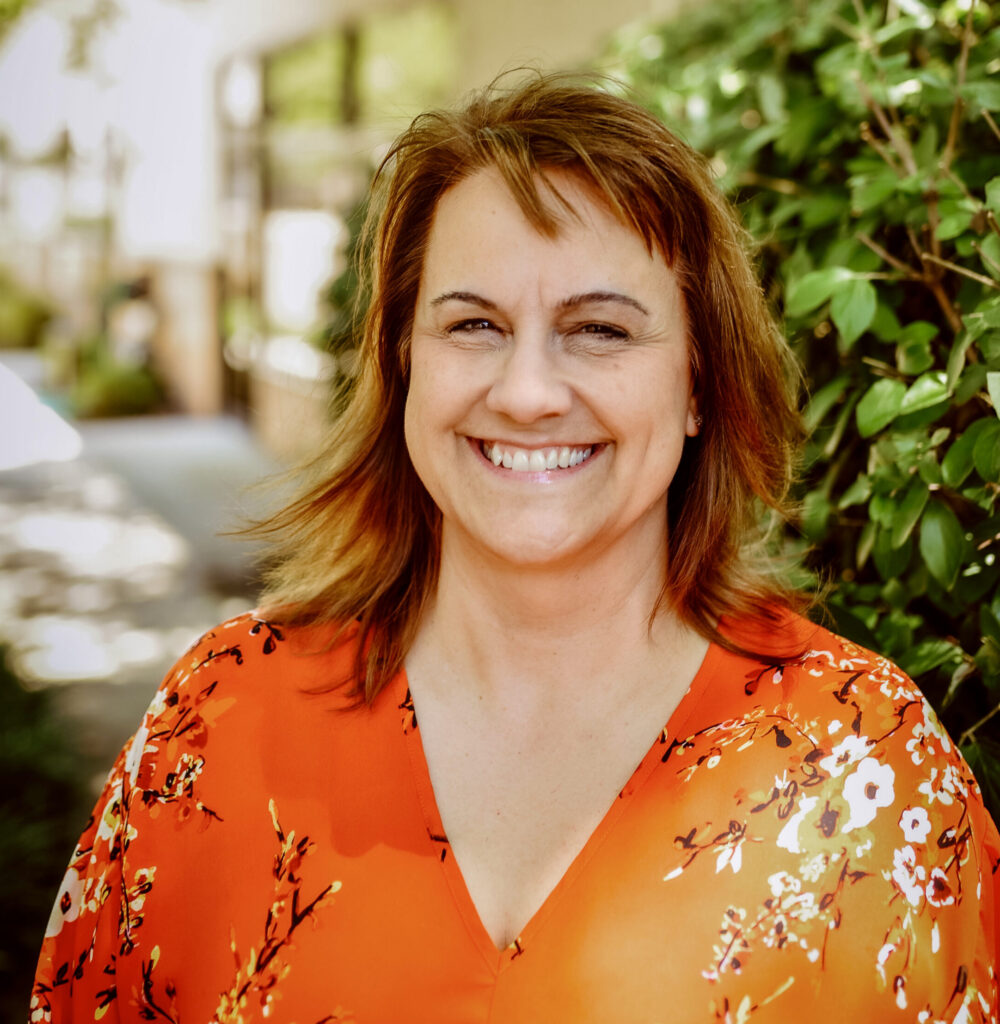
With additional training in dementia care, Deanna went on to oversee activities for one of Leawood's large assisted living and memory care communities. She left there in the Spring of 2022 to join Care Haven.
Full-time and hands-on, managing both staff and volunteers, Deanna runs a robust program. She arranges various special events and in-home entertainment, including rousing games, talented art teachers, engaging performers, precious pets and all-house celebrations. Deanna also helps caregivers integrate popular pastimes like baking and gardening into residents' daily routines. Most importantly, she creates and guides social interactions that all our residents enjoy.
And, of course, Deanna keeps us organized. Look for the calendar she emails families monthly!
Our Activities Director prepares a detailed monthly calendar for every home. But our activities staff changes course whenever the plan doesn’t match everyone’s mood or energy level. We see that each resident engages in the best pastime for them. After all, that’s how we show our respect for the extraordinary adults in our care.
We encourage pursuits that residents find meaningful. And we give group activities the time and encouragement to unfold, gradually opening into remarkable shared experiences.
For instance, we recently began art appreciation by studying a painting of a barn. One woman beamed as she described the fancy dresses she’d worn to barn dances. Then a typically solemn fellow surprised us with a smile. He met his wife at a barn dance!
You see, the activity had less to do with art than stirring warm feelings that lasted long after the session ended.

With additional training in dementia care, Deanna went on to oversee activities for one of Leawood's large assisted living and memory care communities. She left there in the Spring of 2022 to join Care Haven.
Full-time and hands-on, managing both staff and volunteers, Deanna runs a robust program. She arranges various special events and in-home entertainment, including rousing games, talented art teachers, engaging performers, precious pets and all-house celebrations. Deanna also helps caregivers integrate popular pastimes like baking and gardening into residents' daily routines. Most importantly, she creates and guides social interactions that all our residents enjoy.
And, of course, Deanna keeps us organized. Look for the calendar she emails families monthly!
Our Activities Director prepares a detailed monthly calendar for every home. But our activities staff changes course whenever the plan doesn’t match everyone’s mood or energy level. We see that each resident engages in the best pastime for them. After all, that’s how we show our respect for the extraordinary adults in our care.
We encourage pursuits that residents find meaningful. And we give group activities the time and encouragement to unfold, gradually opening into remarkable shared experiences.
For instance, we recently began art appreciation by studying a painting of a barn. One woman beamed as she described the fancy dresses she’d worn to barn dances. Then a typically solemn fellow surprised us with a smile. He met his wife at a barn dance!
You see, the activity had less to do with art than stirring warm feelings that lasted long after the session ended.
Memory care activities that serve a purpose
From all-hands celebrations to quiet, private moments, we create opportunities for residents to
- Socialize
- Remain active and mobile
- Improve balance, stability, strength and coordination
- Reinforce memory, reasoning and language skills
- Act independently, choosing how to spend their time
- Make the most of every day
Click the headings below to learn more about Care Haven’s activities program.
Monthly Calendar
A formal plan, readily adjusted
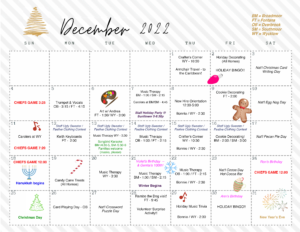 At the beginning of each month, residents’ family members receive an email from our Activities Director with a schedule of upcoming activities.
At the beginning of each month, residents’ family members receive an email from our Activities Director with a schedule of upcoming activities.
Preparing the calendar is critical to planning and organizing a quality memory care activities program. As important, sharing it lets you
- Peek into your loved one’s daily life and find a conversation starter for your next visit.
- Better understand photos of the fun posted on our Facebook page (which you can view here without a Facebook account).
- Make the most of the time you devote to visiting. By checking the calendar, you avoid interrupting your loved one during a favorite activity — or their much-needed rest afterward. (Of course, if you give us notice, you can often join the fun, too!)
Speaking of favorites, the community within each house has its own. We tailor each home’s calendar to match the interests and abilities of its residents, adjusting as that group’s interests and abilities evolve. There also are a few universal favorites — we urge all residents to try them.
Note: A calendar presents our PLAN. It’s a starting point, subject to change due to illness or other urgent matters in our homes, changes in volunteers’ health or schedules, etc. While the Plan is subject to change, our focus won’t. We always find a way to draw residents into enjoyable pastimes and rewarding interactions.
Music
Why We Play the Tambourine
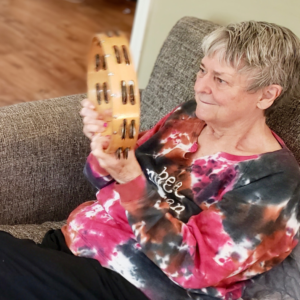 When AARP’s Global Council on Brain Health (GCBH) studied the impact of music on the brain, it found that music plays a powerful role in supporting brain health and functioning — for reasons we don’t fully understand.1 Music helps many parts of the brain work better both individually and together, benefitting all adults. Mysteriously, “musical appreciation is typically preserved longer than other skills during the course of dementia,” activating areas of the brain well into the late stages of Alzheimer’s disease.
When AARP’s Global Council on Brain Health (GCBH) studied the impact of music on the brain, it found that music plays a powerful role in supporting brain health and functioning — for reasons we don’t fully understand.1 Music helps many parts of the brain work better both individually and together, benefitting all adults. Mysteriously, “musical appreciation is typically preserved longer than other skills during the course of dementia,” activating areas of the brain well into the late stages of Alzheimer’s disease.
Like many other experts in dementia care, we believe:
- Music improves the mood and quality of life of people with dementia. It reduces anxiety and depression.
- People calm down when they listen to music they like, allowing them to recall pleasant, meaningful memories or emotions.
- Music helps people with dementia share positive experiences with others. It’s also an excellent way to reinforce warm, trusting relationships with caregivers.
The power of the group
While we occasionally create individual playlists for residents, we encourage them to enjoy music together. As the well-respected neurologist Oliver Sacks said,2
“People can become very isolated with dementia, and music therapy as group therapy can have a tremendous bonding effect. People not only respond as individuals to familiar music; they sing together and become a group. They become conscious of and interact with each other.”
So, you’ll find us toe-tapping and humming, dancing along whenever we can. Some days we play musical games. On others, we bring in soloists, performing groups or music therapists. And, of course, we rarely pass an opportunity to applaud young musical volunteers.
2 https://www.brainandlife.org/articles/unchained-by-melody/
Other Group Activities
Let’s get together, but don’t supersize me!
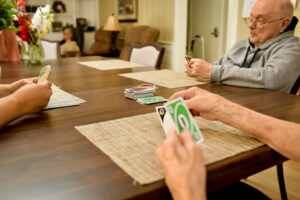 Small communities like ours are ideal for a memory care program featuring social activities. With up to 8 people per home (plus caregivers), residents can always find someone to join a favorite pastime. As important, no one is relegated to the sidelines or their room because they couldn’t find the sign-up sheet.
Small communities like ours are ideal for a memory care program featuring social activities. With up to 8 people per home (plus caregivers), residents can always find someone to join a favorite pastime. As important, no one is relegated to the sidelines or their room because they couldn’t find the sign-up sheet.
So, if everyone’s in the mood, we all gather for a rousing round of trivia or Uno. Our dining tables often resemble busy art studios — unless we need the room to whip up Kitchen Creations — or for our puzzlers to jigsaw side-by-side. Some days you’ll find chair yoga, indoor volleyball or tai chi in the living room or even a ring toss tournament on the lawn.
However, everyone isn’t always in the mood for fun and games. So, we adapt our plans to meet each resident wherever they are on a particular day. Opting out of a group activity doesn’t mean they fend for themselves. With a high staffing ratio, our Activities Director can call bingo numbers while a caregiver guides the hose for an avid gardener.
We’re careful to avoid confusing, agitating or tiring residents when we gather. If your loved one detests this month’s trivia topic, then do you want them to grind their teeth while playing or retreat to their room? Why can’t they stroll past the feeders with a fellow birder or play a quiet game of solitaire on the deck? And if they’re sleepy, why shouldn’t they take a short nap?
After all, personalization is all about personal choice.
A Sampling of Group Memory Care Activities
The following are a few of the events you’ll find on our calendar:
- Armchair Travels
- Art with Andrea
- Crafter’s Corner
- Culinary Creations
- The Daily Chronicle (to trigger and share memories of historical events)
- Game Day (bingo, board games, cards, dominoes, matching — we focus on community favorites)
- Nail Spa & Relaxation (so everyone feels their best — we also have separate salon services)
- National Holiday Celebrations (yes, we celebrate Crazy Sunglasses, Go Fishing, Golden Girlfriend & Root Beer Float Days — let us know of any your loved one observes)
- Puzzlemania
- Seasonal Decorating
- Short Stories
- Spectator Sports (many loyal fans live here, and we all get behind their teams — you should see our game day spreads!)
- Themed Trivia
Our Gardens
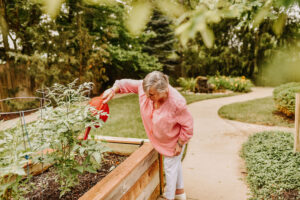
How they bloom!
“I cannot say exactly how nature exerts its calming and organizing effects on our brains, but I have seen in my patients the restorative and healing powers of nature and gardens. . . . In many cases, gardens and nature are more powerful than any medication.” 3
— Oliver Sacks
Since we opened our first home, we’ve always made room for raised beds, planters and pots in our yards. Planting, tending and harvesting lend a gentle rhythm to the lives of our small communities. Yes, master gardeners recall prize roses and tomatoes. But even nongardeners find refuge among the vegetables and flowers. Weeding, watering and checking the crops are great excuses to venture outside alone or to join a friend — enjoy the fresh air — and engage in simple tasks that reap lovely or tasty rewards.
Gardening also brings us new jobs indoors: arranging blooms, snapping green beans or tossing cucumbers in the salad. As it does in your home.
Of course, our staff does the heavy lifting — literally. The Activities Director ensures that soil is supplemented, turned and ready for planting. She delivers the seeds and bedding plants (or arranges a shopping expedition to a nearby nursery). We also handle the staking and tedious weeding, watering when it’s hot and cleaning up at season’s end.
Some family members enjoy time spent gardening side-by-side with a loved one. Let our Activities Director or your House Manager know if you’d like to give it a try.
3 Quoted in Oliver Sacks: The Healing Power of Nature and Gardens, from the essay “Why We Need Gardens” in Sacks’ book Everything in Its Place: First Loves and Last Tales (2019, published posthumously)
Other Integrated Activities
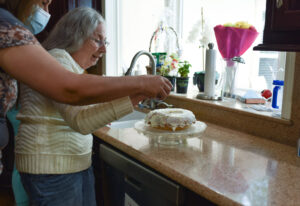 A Better Everyday Life
A Better Everyday Life
Cruise ships and luxury resorts are lovely vacation destinations. They’re delightful places to get away from our daily responsibilities.
But how many of us want to live this sort of life year-round? We’d miss the friends and familiar routines that ground and comfort us.
So, while we carefully plan a formal memory care activities program, we also pay attention to how residents spend the unstructured portions of their days. We support them in sustaining the routines THEY love.
For some, that means we deliver the morning paper with their coffee. For others, we read a few interesting articles aloud. Or maybe, instead, we sit down with someone to list the ingredients they need for this afternoon’s baking date.
Memory care activities both peaceful and purposeful
Our residents live at home here, so they feel free to putter about the house. There are bird feeders to fill — then seed to sweep off the deck. The flower garden needs deadheading. There are also pies to make, towels to fold, corn to shuck and tables to set. (Of course, our dogs always appreciate a tummy rub, too.)
But none of these is a chore. Each is a task residents ask to do, giving purpose to the day when they’re weary of games, crafts and other diversions. (Rest assured: if residents are tired and out-of-sorts, if it’s too hot to garden or too icy to sweep the deck, we keep the household humming while they relax.)
Outings
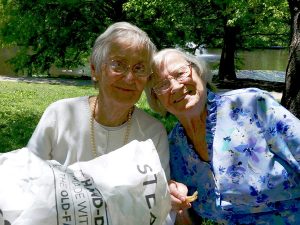 Out and About
Out and About
Our Activities Director and one or two caregivers occasionally invite a few residents to join them on an adventure.
As a small group traveling about in the Care Haven van, it’s easy to stay together — and to return quickly if someone feels restless, unwell or out of sorts.
Our residents sometimes take less formal trips with staff: shopping at the Farmers’ Market or warehouse club, riding around the park or ordering a malt at the drive-thru window. It’s nice to get out of the house from time to time, weather, health and circumstances permitting.
Events & Celebrations
Festive celebrations
 In each home, we celebrate birthdays, special anniversaries and the holidays important to its residents. We decorate, then make and share unique seasonal dishes or treats with one another.
In each home, we celebrate birthdays, special anniversaries and the holidays important to its residents. We decorate, then make and share unique seasonal dishes or treats with one another.
We’re respectful of all residents’ traditions. Please let our Activities Director or your House Manager know if you need help ensuring your loved one observes theirs. We also make residents’ safety and comfort top priorities when planning celebrations. Please limit any decorating to your loved one’s room. Regretfully, we cannot accommodate large groups in our homes for family celebrations.
Holiday Dinners
We serve our residents special dinners on Thanksgiving and Christmas. You may stop by anytime on those days, but we only plan to serve residents. We suggest you instead visit during the morning, late afternoon, or early evening. That gives your loved one time to relax before and after the mid-day meal — and for you to enjoy your feast at home!
- Our residents prefer short visits by small groups. It’s best to avoid noisy gatherings that confuse or upset them.
- Be sure visitors aren’t gifting your loved one a bug or virus!
Planning a party at home?
Help us help your loved one
- Has a hard time on a memorable date or during a particular season,
- Associates a specific time with past traumatic events or
- Appears unusually depressed or troubled by certain traditions or memories.
Staying in Touch with Families
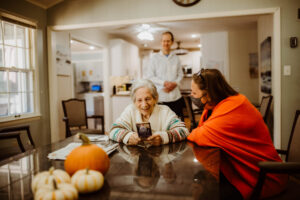 Visits
Visits
After living through a pandemic, we never take visits for granted. They’re one of our residents’ favorite activities, and we know they’ll be one of yours, too. So, even when protecting your loved one from the threat of serious illness, we do everything in our power to help you spend precious moments together.
While we hope you’ll be mindful of the house schedule and sleep routine, we don’t post formal visiting hours. We do, however, ask that you keep visiting groups small. We don’t want fellow residents to feel forced out of the common spaces into their rooms. If you’re planning something big, please let us help you make arrangements that work for everyone.
When you can’t visit
You needn’t cut vacations or business trips short to “drop in,” either. We encourage old-fashioned phone calls and video visits when circumstances prevent you from joining us at home.
You likely have access to a computer, tablet or mobile phone. Most of our families also know how to use FaceTime, Zoom or other apps to enjoy each others’ smiling faces. (If you don’t, then we’re happy to show you.) As long as you notify our Activities Director or your House Manager beforehand, we’ll ensure Mom or Dad is ready for your call.
Visit our Resources section for more suggestions on staying connected with seniors when you can’t visit.
By the way, if you sometimes feel awkward during either online or in-person visits, rest assured: it’s not just you. Our team has plenty of ideas for keeping your time together comfortable. Please don’t hesitate to ask.
Monthly Calendar
A formal plan, readily adjusted
 At the beginning of each month, residents’ family members receive an email from our Activities Director with a schedule of upcoming activities.
At the beginning of each month, residents’ family members receive an email from our Activities Director with a schedule of upcoming activities.
Preparing the calendar is critical to planning and organizing a quality memory care activities program. As important, sharing it lets you
- Peek into your loved one’s daily life and find a conversation starter for your next visit.
- Better understand photos of the fun posted on our Facebook page (which you can view here without a Facebook account).
- Make the most of the time you devote to visiting. By checking the calendar, you avoid interrupting your loved one during a favorite activity — or their much-needed rest afterward. (Of course, if you give us notice, you can often join the fun, too!)
Speaking of favorites, the community within each house has its own. We tailor each home’s calendar to match the interests and abilities of its residents, adjusting as that group’s interests and abilities evolve. There also are a few universal favorites — we urge all residents to try them.
Note: A calendar presents our PLAN. It’s a starting point, subject to change due to illness or other urgent matters in our homes, changes in volunteers’ health or schedules, etc. While the Plan is subject to change, our focus won’t. We always find a way to draw residents into enjoyable pastimes and rewarding interactions.
Music
Why We Play the Tambourine
 When AARP’s Global Council on Brain Health (GCBH) studied the impact of music on the brain, it found that music plays a powerful role in supporting brain health and functioning — for reasons we don’t fully understand.1 Music helps many parts of the brain work better both individually and together, benefitting all adults. Mysteriously, “musical appreciation is typically preserved longer than other skills during the course of dementia,” activating areas of the brain well into the late stages of Alzheimer’s disease.
When AARP’s Global Council on Brain Health (GCBH) studied the impact of music on the brain, it found that music plays a powerful role in supporting brain health and functioning — for reasons we don’t fully understand.1 Music helps many parts of the brain work better both individually and together, benefitting all adults. Mysteriously, “musical appreciation is typically preserved longer than other skills during the course of dementia,” activating areas of the brain well into the late stages of Alzheimer’s disease.
Like many other experts in dementia care, we believe:
- Music improves the mood and quality of life of people with dementia. It reduces anxiety and depression.
- People calm down when they listen to music they like, allowing them to recall pleasant, meaningful memories or emotions.
- Music helps people with dementia share positive experiences with others. It’s also an excellent way to reinforce warm, trusting relationships with caregivers.
The power of the group
While we occasionally create individual playlists for residents, we encourage them to enjoy music together. As the well-respected neurologist Oliver Sacks said,2
“People can become very isolated with dementia, and music therapy as group therapy can have a tremendous bonding effect. People not only respond as individuals to familiar music; they sing together and become a group. They become conscious of and interact with each other.”
So, you’ll find us toe-tapping and humming, dancing along whenever we can. Some days we play musical games. On others, we bring in soloists, performing groups or music therapists. And, of course, we rarely pass an opportunity to applaud young musical volunteers.
2 https://www.brainandlife.org/articles/unchained-by-melody/
Other Group Activities
Let’s get together, but don’t supersize me!
 Small communities like ours are ideal for a memory care program featuring social activities. With up to 8 people per home (plus caregivers), residents can always find someone to join a favorite pastime. As important, no one is relegated to the sidelines or their room because they couldn’t find the sign-up sheet.
Small communities like ours are ideal for a memory care program featuring social activities. With up to 8 people per home (plus caregivers), residents can always find someone to join a favorite pastime. As important, no one is relegated to the sidelines or their room because they couldn’t find the sign-up sheet.
So, if everyone’s in the mood, we all gather for a rousing round of trivia or Uno. Our dining tables often resemble busy art studios — unless we need the room to whip up Kitchen Creations — or for our puzzlers to jigsaw side-by-side. Some days you’ll find chair yoga, indoor volleyball or tai chi in the living room or even a ring toss tournament on the lawn.
However, everyone isn’t always in the mood for fun and games. So, we adapt our plans to meet each resident wherever they are on a particular day. Opting out of a group activity doesn’t mean they fend for themselves. With a high staffing ratio, our Activities Director can call bingo numbers while a caregiver guides the hose for an avid gardener.
We’re careful to avoid confusing, agitating or tiring residents when we gather. If your loved one detests this month’s trivia topic, then do you want them to grind their teeth while playing or retreat to their room? Why can’t they stroll past the feeders with a fellow birder or play a quiet game of solitaire on the deck? And if they’re sleepy, why shouldn’t they take a short nap?
After all, personalization is all about personal choice.
A Sampling of Group Memory Care Activities
The following are a few of the events you’ll find on our calendar:
- Armchair Travels
- Art with Andrea
- Crafter’s Corner
- Culinary Creations
- The Daily Chronicle (to trigger and share memories of historical events)
- Game Day (bingo, board games, cards, dominoes, matching — we focus on community favorites)
- Nail Spa & Relaxation (so everyone feels their best — we also have separate salon services)
- National Holiday Celebrations (yes, we celebrate Crazy Sunglasses, Go Fishing, Golden Girlfriend & Root Beer Float Days — let us know of any your loved one observes)
- Puzzlemania
- Seasonal Decorating
- Short Stories
- Spectator Sports (many loyal fans live here, and we all get behind their teams — you should see our game day spreads!)
- Themed Trivia
Our Gardens

How they bloom!
“I cannot say exactly how nature exerts its calming and organizing effects on our brains, but I have seen in my patients the restorative and healing powers of nature and gardens. . . . In many cases, gardens and nature are more powerful than any medication.” 3
— Oliver Sacks
Since we opened our first home, we’ve always made room for raised beds, planters and pots in our yards. Planting, tending and harvesting lend a gentle rhythm to the lives of our small communities. Yes, master gardeners recall prize roses and tomatoes. But even nongardeners find refuge among the vegetables and flowers. Weeding, watering and checking the crops are great excuses to venture outside alone or to join a friend — enjoy the fresh air — and engage in simple tasks that reap lovely or tasty rewards.
Gardening also brings us new jobs indoors: arranging blooms, snapping green beans or tossing cucumbers in the salad. As it does in your home.
Of course, our staff does the heavy lifting — literally. The Activities Director ensures that soil is supplemented, turned and ready for planting. She delivers the seeds and bedding plants (or arranges a shopping expedition to a nearby nursery). We also handle the staking and tedious weeding, watering when it’s hot and cleaning up at season’s end.
Some family members enjoy time spent gardening side-by-side with a loved one. Let our Activities Director or your House Manager know if you’d like to give it a try.
3 Quoted in Oliver Sacks: The Healing Power of Nature and Gardens, from the essay “Why We Need Gardens” in Sacks’ book Everything in Its Place: First Loves and Last Tales (2019, published posthumously)
Other Integrated Activities
 A Better Everyday Life
A Better Everyday Life
Cruise ships and luxury resorts are lovely vacation destinations. They’re delightful places to get away from our daily responsibilities.
But how many of us want to live this sort of life year-round? We’d miss the friends and familiar routines that ground and comfort us.
So, while we carefully plan a formal memory care activities program, we also pay attention to how residents spend the unstructured portions of their days. We support them in sustaining the routines THEY love.
For some, that means we deliver the morning paper with their coffee. For others, we read a few interesting articles aloud. Or maybe, instead, we sit down with someone to list the ingredients they need for this afternoon’s baking date.
Memory care activities both peaceful and purposeful
Our residents live at home here, so they feel free to putter about the house. There are bird feeders to fill — then seed to sweep off the deck. The flower garden needs deadheading. There are also pies to make, towels to fold, corn to shuck and tables to set. (Of course, our dogs always appreciate a tummy rub, too.)
But none of these is a chore. Each is a task residents ask to do, giving purpose to the day when they’re weary of games, crafts and other diversions. (Rest assured: if residents are tired and out-of-sorts, if it’s too hot to garden or too icy to sweep the deck, we keep the household humming while they relax.)
Outings
 Out and About
Out and About
Our Activities Director and one or two caregivers occasionally invite a few residents to join them on an adventure.
As a small group traveling about in the Care Haven van, it’s easy to stay together — and to return quickly if someone feels restless, unwell or out of sorts.
Our residents sometimes take less formal trips with staff: shopping at the Farmers’ Market or warehouse club, riding around the park or ordering a malt at the drive-thru window. It’s nice to get out of the house from time to time, weather, health and circumstances permitting.
Events & Celebrations
Festive celebrations
 In each home, we celebrate birthdays, special anniversaries and the holidays important to its residents. We decorate, then make and share unique seasonal dishes or treats with one another.
In each home, we celebrate birthdays, special anniversaries and the holidays important to its residents. We decorate, then make and share unique seasonal dishes or treats with one another.
We’re respectful of all residents’ traditions. Please let our Activities Director or your House Manager know if you need help ensuring your loved one observes theirs. We also make residents’ safety and comfort top priorities when planning celebrations. Please limit any decorating to your loved one’s room. Regretfully, we cannot accommodate large groups in our homes for family celebrations.
Holiday Dinners
We serve our residents special dinners on Thanksgiving and Christmas. You may stop by anytime on those days, but we only plan to serve residents. We suggest you instead visit during the morning, late afternoon, or early evening. That gives your loved one time to relax before and after the mid-day meal — and for you to enjoy your feast at home!
- Our residents prefer short visits by small groups. It’s best to avoid noisy gatherings that confuse or upset them.
- Be sure visitors aren’t gifting your loved one a bug or virus!
Planning a party at home?
Help us help your loved one
- Has a hard time on a memorable date or during a particular season,
- Associates a specific time with past traumatic events or
- Appears unusually depressed or troubled by certain traditions or memories.
Staying in Touch with Families
 Visits
Visits
After living through a pandemic, we never take visits for granted. They’re one of our residents’ favorite activities, and we know they’ll be one of yours, too. So, even when protecting your loved one from the threat of serious illness, we do everything in our power to help you spend precious moments together.
While we hope you’ll be mindful of the house schedule and sleep routine, we don’t post formal visiting hours. We do, however, ask that you keep visiting groups small. We don’t want fellow residents to feel forced out of the common spaces into their rooms. If you’re planning something big, please let us help you make arrangements that work for everyone.
When you can’t visit
You needn’t cut vacations or business trips short to “drop in,” either. We encourage old-fashioned phone calls and video visits when circumstances prevent you from joining us at home.
You likely have access to a computer, tablet or mobile phone. Most of our families also know how to use FaceTime, Zoom or other apps to enjoy each others’ smiling faces. (If you don’t, then we’re happy to show you.) As long as you notify our Activities Director or your House Manager beforehand, we’ll ensure Mom or Dad is ready for your call.
Visit our Resources section for more suggestions on staying connected with seniors when you can’t visit.
By the way, if you sometimes feel awkward during either online or in-person visits, rest assured: it’s not just you. Our team has plenty of ideas for keeping your time together comfortable. Please don’t hesitate to ask.
Pet therapy
Meet some of our best friends
While pet therapy is a highly effective memory care activity, it’s much more than that. As far as our residents and families are concerned, our animal companions are rockstars. They’re more entertaining and perceptive than many humans, with mysterious ways of calming, cheering and caring for all of us.
So, meet the most prominent members of our furry and feathered team, pictured below. It includes two gentle “house dogs,” seniors themselves, and one house parakeet. Our Director of Nursing and Operations Manager also visit our homes with their young pups, who consider themselves part of the Care Haven pack. And a handful of favorite volunteers regularly visit with their well-behaved four-legged companions, too.
